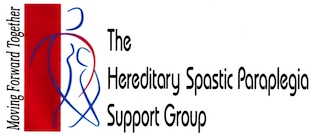Childhood onset HSP
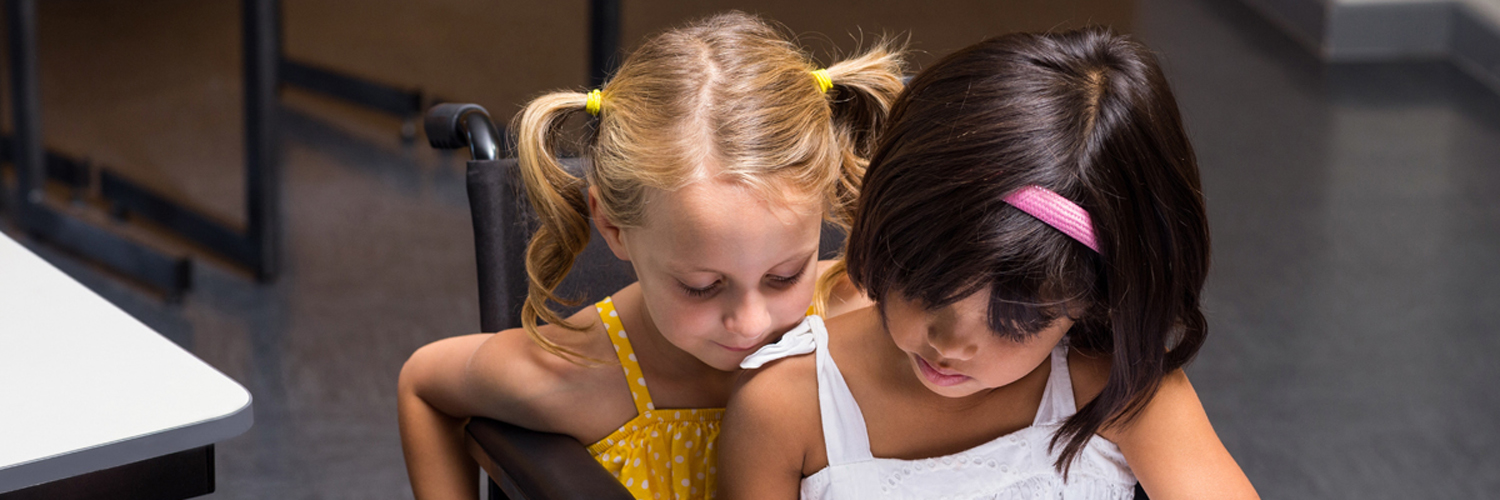
What is Childhood Onset HSP?
While hereditary spastic paraplegia (HSP) is more broadly known as an adult-onset rare neurological condition, it also affects children.
Like adult-onset HSP, childhood onset hereditary spastic paraplegia (HSP) is a rare neurological disorder that primarily affects the legs and causes progressive stiffness and weakness of the muscles. It is caused by genetic mutations that affect the function of the nerve cells responsible for controlling muscle movement.
Childhood HSP can be present from birth and starts being detected when children start missing developmental milestones. In other cases, children develop symptoms gradually, with a majority of children starting their symptoms around the age of three.
In a recent survey with 191 childhood onset HSP participants, it was found that 60% of children started symptoms before the age of 2 and 80% before the age of 5.
Symptoms of Childhood HSP
The symptoms of HSP can vary widely from person to person, but typically include difficulty with walking, muscle spasms, muscle weakness, and problems with balance and coordination. These symptoms may be mild or severe, and may worsen over time as the disease progresses. However, symptoms such as upper limb involvement, learning disability or seizures may occur in more complex cases.
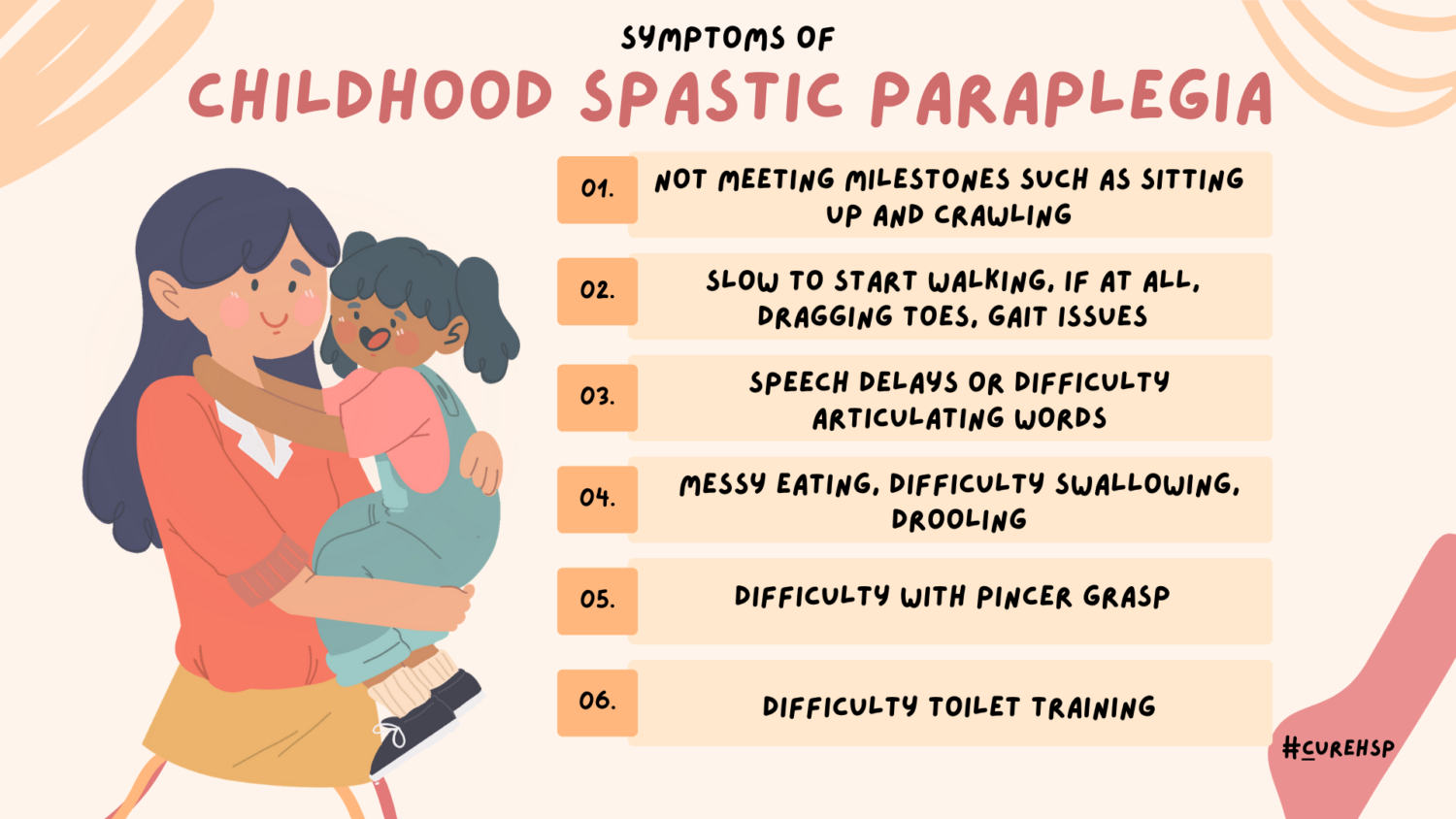
Diagnosis & Misdiagnosis in the UK
The diagnosis of HSP in children in the UK usually begins with a comprehensive medical evaluation and neurological exam by a specialist, such as a neurologist or a geneticist. The doctor will review the child's medical history, perform a physical examination, and assess the child's motor skills, muscle tone, reflexes, and coordination.
In general, genetic testing is required to confirm the diagnosis and identify the specific genetic mutation that is causing the disease. This may involve a blood or saliva test to analyse the child's DNA.
Imaging tests, such as magnetic resonance imaging (MRI) or computed tomography (CT) scans, may also be ordered to evaluate the brain and spinal cord for any structural abnormalities or signs of degeneration.
It's important to note that the diagnostic process for HSP can be complex and may involve multiple tests and evaluations over time. A definitive diagnosis may take several months or even years to confirm, and may involve consultation with multiple medical specialists.
It’s also important to note that, due to the similarities of the symptoms, childhood HSP can sometimes be misdiagnosed as cerebral palsy (CP) which is the most common motor disability in childhood.
If your child is showing developmental delays, please raise the possibility of HSP and request genetic testing.
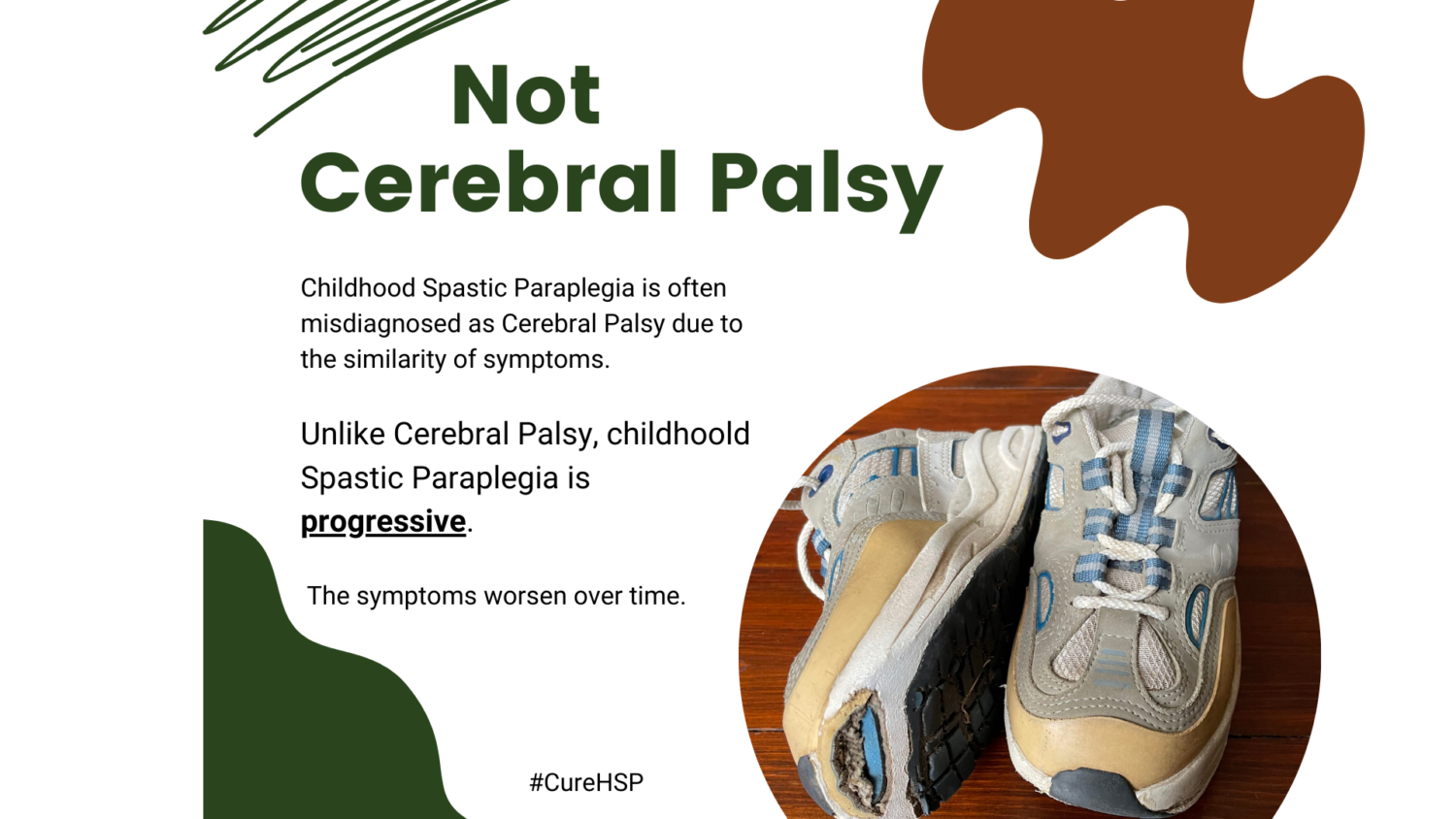
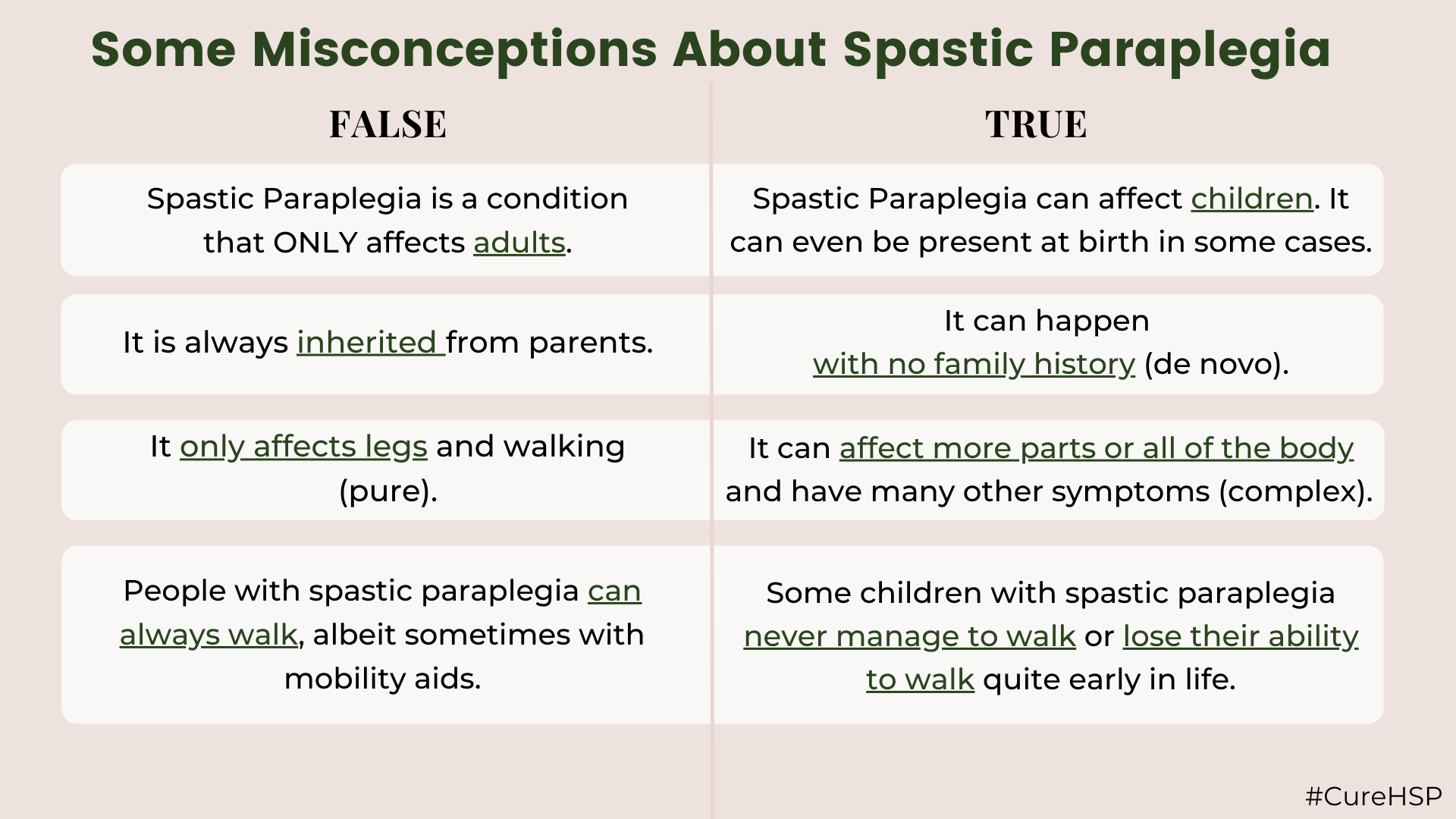
Management and Treatment Options
There is currently no cure for HSP.
Treatment options are available to manage symptoms and improve quality of life. These may include physical therapy, medications to manage muscle spasticity and pain, and assistive devices such as braces or orthotics to improve mobility. It's important to note that the progression of HSP can be unpredictable, and the course of the disease can vary widely from person to person.
Education
Most children with HSP will require an Education, Health and Care Plan (EHCP) to get additional support during their schooling. This might involve learning support assistance, various therapies at school and provision of assistive equipment.
An EHCP is a legal document outlining the care and services that will be provided for your child by the local authority. There are many websites providing information to help parents, however this website from the Independent Provider of Special Education Advice (IPSEA) is a great place to start.
While some children with HSP can go to mainstream schools with additional support provisions under EHCPs, some, especially those with more complex conditions, might benefit from special schools.
This article from the Scope Charity can be helpful in determining what type of school to choose for your child.
Family Zoom Meetings
The HSP Support Group is keen to support young people with HSP, and has hosted a series of Zoom meetings for families who have a child or children with HSP.
We are looking for parents, to help run more regular Zoom meetings to connect with others, to give and receive help and support. If you are interested, please do contact us, your help will be highly appreciated or visit our Meetings page to find out more.
View all our upcoming meetings and events.
Research for a Cure
While there is no known cure for HSP, significant research is ongoing to find treatments for various types of childhood onset HSP.
Childhood Spastic Paraplegia Initiatives at Boston Children’s Hospital
Dr Darius Ebrahimi-Fakhari from Boston Children’s Hospital is running two important initiatives to help children with early onset HSP from around the world.
Natural History Study for Early Onset HSP
Natural history studies are critical for rare diseases. Without them, treatment options will not be available. Future clinical trials related to cures for childhood HSP will likely rely on this registry.
The study is still seeking participants globally.
Participation is FREE and involves a 1 hour Zoom consultation with Dr Darius.
To participate, please reach out to Amy Tam, the Study Coordinator, on her email:
Inclusion criteria:
- Onset of hereditary spastic paraplegia symptoms before the age of 18 years
- Current age under 30
- Having variants in HSP related genes and/or a relative with such a diagnosis
Hereditary Spastic Paraplegia Genomic Sequencing Initiative (HSPseq)
This study is aimed at families who do not have a genetic diagnosis but their clinical symptoms point towards HSP.
The study is still seeking participants globally.
The goal of the study is to:
- Identify genetic variants in patients with progressive spastic paraplegia
- Compare phenotype/genotype associations via genome wide scanning
Participation is FREE. It involves a 1 hour Zoom consultation with Dr. Darius and they facilitate remote collection of samples.
To participate, please reach out to Amy Tam, the Study Coordinator, on her email:
Inclusion criteria:
- Male or female, under 30 years, with suspected HSP
- Clinical diagnosis of progressive spasticity
Carter Foundation and Kids with SPG3A
The Carter Foundation was set up by Dr. Joseph Avallone after her grandson was diagnosed with SPG3A. The goal of the Foundation is to sponsor research into the cause and treatment of rare neurologic diseases in children. Dr. Craig Blackstone, Chief of Movement Disorders, Department of Neurology, Massachusetts General Hospital serves as the Senior Scientific Advisor to the Foundation and is a prominent research scientist with a long term focus on the Hereditary Spastic Paraplegias.
They are currently testing a number of treatment options on mice. You can watch their latest research update presentation here and join the Kids with SPG3A Community to get the latest updates on their research.
Life with HSP Research
Researchers at the University of Sheffield are looking for young people with HSP and parents of a child with HSP to take part in an online interview. They are researching how HSP affects young people and their families, as well as their experiences with the NHS and healthcare teams. This research is to help find improvements for NHS care and delivery, and how young people with HSP and their families can be better supported. If you are interested in taking part, please email elgaskin1@sheffield.ac.uk for more information.
HSP-type Specific Organisations
Many charities, set up by parents of children with HSP, focus on financing research into finding cures for specific types of HSPs. Please reach out to these organisations or follow them on social media to get the latest on their research efforts:
- Cure AP-4 (SPG47, SPG50, and SPG51) - US
- Cure SPG4 - US
- The Lily & Blair Foundation (De Novo SPG4) - US
- Carter Foundation - Kids with SPG3A (SPG3A) - US
- Cure SPG50 - Canada
- Enorev - France
- Our Moon's Mission (SPG 56) - Australia
- Saving Jordan Foundation (SPG49)
- The Maddi Foundation (SPG15) - UK
- Eleanor Kaplan Foundation (SPG49) - US
